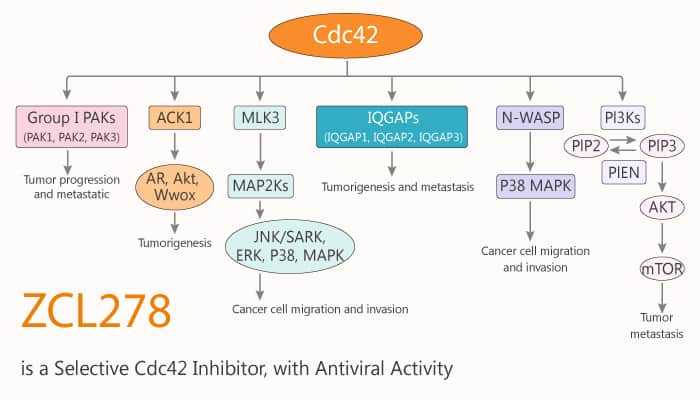Cdc42 is a member of the Rho GTPase family of low molecular weight G proteins. It is an important regulator of many biological processes. Besides, Cdc42 plays key roles in cytoskeletal organization, vesicular trafficking, cell cycle control, and transcription. As with most GTPases, transduction of signals occurs through the exchange of GDP for GTP, thus activating Cdc42. Moreover, recent studies have implicated aberrant Cdc42 activity in a variety of human pathologic processes, including cancer and neurodegeneration. Interestingly, deregulation or overexpression of Cdc42 caused abnormal phenotypes in an apparent tissue- and microenvironment-dependent fashion. Furthermore, as a key regulator of neurite morphogenesis, Cdc42 shows to be crucial for normal brain development. Because conditional Cdc42 KO mice do not survive birth and show gross brain abnormalities. ZCL278 is a potent and selective Cdc42 inhibitor a Kd of 11.4 μM for Cdc42-ZCL278 affinity in surface plasmon resonance (SPR) experiment with antiviral activity.

ZCL278 is a selective Cdc42 modulator that directly binds to Cdc42 and inhibits its functions with Kd of 11.4 μM for the Cdc42-ZCL278 affinity in surface plasmon resonance (SPR) experiment. In Swiss 3T3 fibroblast cultures, ZCL278 abolished microspike formation and disrupted GM130-docked Golgi structures, two of the most prominent Cdc42-mediated subcellular events. Specifically, ZCL278 reduces the perinuclear accumulation of active Cdc42. Nonetheless, ZCL278 suppresses Cdc42-mediated neuronal branching and growth cone dynamics as well as actin-based motility and migration in a metastatic prostate cancer cell line. Meanwhile, ZCL278 is a small molecule that specifically targets Cdc42-ITSN interaction and inhibits Cdc42-mediated cellular processes. All in all, ZCL278 is a potent and selective Cdc42 inhibitor with anticancer and antiviral activity.
References:
Friesland A, et al. Proc Natl Acad Sci U S A. 2013 Jan 22;110(4):1261-6.